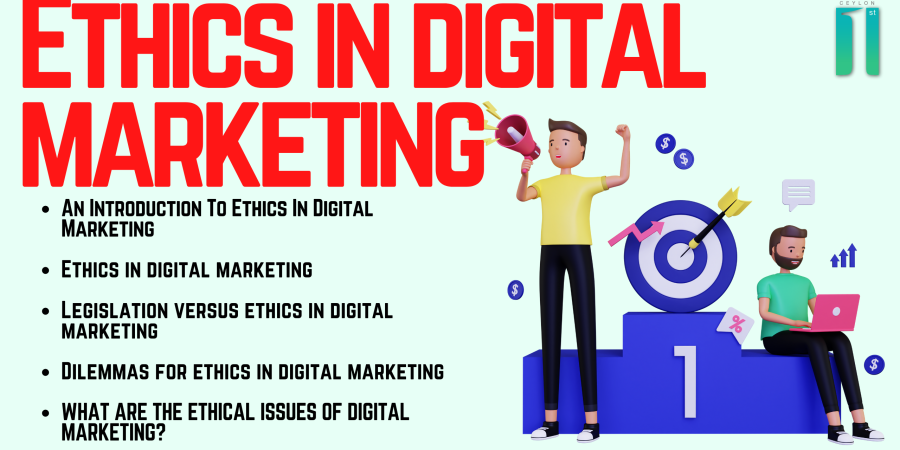Digital marketing is the practice of promoting products or services through digital channels, such as social media, search engines, websites, and mobile applications. Like all forms of marketing, digital marketing also involves ethical considerations. Here are some key ethical principles that should guide digital marketing practices:
- Transparency: Digital marketers should be transparent about their identity, the products or services they are promoting, and the nature of the communication. This includes disclosing any sponsored or paid content and clearly identifying advertisements.
- Privacy: Digital marketers should respect the privacy of consumers and ensure that any data collected is done so with the consumer’s consent and is used only for the purposes for which it was collected.
- Honesty: Digital marketers should be honest in their advertising and avoid making false or misleading claims about products or services.
- Fairness: Digital marketers should treat all consumers fairly and avoid engaging in discriminatory or deceptive practices.
- Responsibility: Digital marketers have a responsibility to ensure that their advertising does not harm individuals or society as a whole. This includes avoiding promoting products or services that are harmful or potentially dangerous.
- Accessibility: Digital marketers should ensure that their advertising is accessible to all individuals, including those with disabilities.
In summary, digital marketers should always operate with integrity, transparency, and respect for consumer rights and privacy. By adhering to these ethical principles, digital marketers can build trust with consumers and contribute to a more sustainable and responsible digital marketing industry.
Ethics in digital marketing
Digital marketing, like any other form of marketing, has ethical implications that should be taken seriously.
Below are some key ethical considerations for digital marketers:
- Transparency: Digital marketers should be transparent in their communication and clearly identify any sponsored or paid content. They should also disclose any information about their identity, the products or services they are promoting, and the nature of their communication.
- Privacy: Digital marketers should respect the privacy of consumers and ensure that any data collected is done so with the consumer’s consent and is used only for the purposes for which it was collected.
- Honesty: Digital marketers should be honest in their advertising and avoid making false or misleading claims about products or services. They should also avoid using deceptive tactics to manipulate consumers.
- Fairness: Digital marketers should treat all consumers fairly and avoid engaging in discriminatory or deceptive practices. They should also avoid targeting vulnerable or marginalized groups.
- Responsibility: Digital marketers have a responsibility to ensure that their advertising does not harm individuals or society as a whole. They should avoid promoting products or services that are harmful or potentially dangerous, and they should also consider the environmental impact of their marketing activities.
- Accessibility: Digital marketers should ensure that their advertising is accessible to all individuals, including those with disabilities.
By adhering to these ethical principles, digital marketers can build trust with consumers and contribute to a more responsible and sustainable digital marketing industry.
Legislation versus ethics in digital marketing
Legislation and ethics are both important considerations for digital marketers, and they can often overlap. Legislation provides a framework of rules and regulations that must be followed, while ethics provide a set of principles that guide behavior and decision-making.
In many cases, legislation and ethical considerations will align, such as in cases where laws require transparent and honest advertising practices. However, there may be instances where legislation and ethical considerations diverge, such as when a particular marketing tactic is technically legal but may be perceived as unethical.
It is important for digital marketers to be aware of both legal and ethical considerations and to ensure that their practices align with both. Adhering to ethical principles can help build trust and credibility with consumers, while complying with legal requirements can prevent legal issues and potential fines.
Ultimately, digital marketers should strive to exceed legal requirements and also prioritize ethical considerations in their marketing practices. This can help build a positive brand image and foster long-term relationships with consumers.
Dilemmas for ethics in digital marketing
There are several dilemmas that digital marketers may face when trying to adhere to ethical principles. Some of the common dilemmas in digital marketing ethics include:
- Balancing marketing goals with consumer privacy: Digital marketers may be tempted to collect and use consumer data for marketing purposes, but this can come at the expense of consumer privacy. Marketers must find a balance between achieving their marketing goals and respecting the privacy rights of consumers.
- Balancing marketing goals with truthfulness: Marketers may be tempted to exaggerate the benefits of a product or service to make it more appealing to consumers. However, this can be seen as misleading or dishonest, which can harm consumer trust.
- Balancing marketing goals with cultural sensitivity: Digital marketers operate in a global marketplace, and what may be acceptable in one culture may not be acceptable in another. Marketers must be aware of cultural differences and avoid using tactics that may be offensive or inappropriate.
- Balancing marketing goals with social responsibility: Marketers may be tempted to promote products or services that are profitable but may be harmful to society or the environment. Marketers must be aware of the social and environmental impact of their marketing practices and take steps to minimize negative impacts.
- Balancing marketing goals with accessibility: Digital marketers must ensure that their marketing materials are accessible to all individuals, including those with disabilities. This can be challenging, as there may be technical or design limitations that prevent accessibility.
Digital marketers must navigate these dilemmas carefully and make decisions that align with ethical principles. By doing so, they can build trust with consumers and promote a more responsible and sustainable digital marketing industry.
What Are The Ethical Issues Of Digital Marketing?
Digital marketing, like any other form of marketing, has ethical implications that should be taken seriously. Here are some of the key ethical issues of digital marketing:
- Privacy: Digital marketers collect data from consumers for targeted advertising, but this can come at the expense of consumer privacy. Marketers must ensure that they collect and use data in a transparent and ethical manner, with consumer consent and only for the intended purposes.
- Deception: Digital marketers may be tempted to use misleading or false advertising to promote products or services. This can harm consumer trust and can lead to legal and reputational consequences.
- Targeting vulnerable groups: Digital marketers must avoid targeting vulnerable groups, such as children, the elderly, or individuals with low income or limited education. These groups may be more susceptible to manipulation, and marketers have a responsibility to ensure that their advertising is fair and respectful.
- Social responsibility: Marketers must be aware of the potential impact of their marketing practices on society and the environment. They must avoid promoting products or services that are harmful to individuals or society as a whole.
- Accessibility: Digital marketers must ensure that their marketing materials are accessible to all individuals, including those with disabilities. This includes providing alternative formats, such as captions or audio descriptions, and ensuring that websites and apps are designed with accessibility in mind.
- Transparency: Digital marketers must be transparent in their communication, clearly identifying any sponsored or paid content. They must also disclose any information about their identity, the products or services they are promoting, and the nature of their communication.
These ethical issues of digital marketing highlight the importance of responsible and transparent advertising practices that prioritise consumer privacy, fairness, and social responsibility. By adhering to ethical principles, digital marketers can build trust with consumers and contribute to a more sustainable and responsible digital marketing industry.
CEYLON FIRST



Leave feedback about this